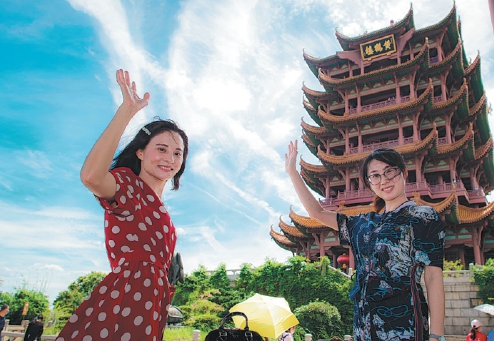Wuhan minds the way to recovery


For the most part, a year since its lockdown was lifted, life in the city has returned to normal, but deeper scars remain
In Wuhan's Hongshan Gymnasium, Pei Haodong takes off his mask to play badminton, unfazed by the fact that the place was once a major battleground in the fight against COVID-19.
The gym was converted into a temporary hospital in early 2020. It helped overloaded hospitals to treat 1,124 COVID-19 patients before ceasing operations on March 10, when infections began to wane.
A year has passed since Wuhan, capital of Hubei province and the hardest-hit Chinese city during the outbreak, emerged from its strict lockdown, and vitality has returned to the gym. During the Qingming Festival holiday from April 3 to 5, it was fully booked by sports enthusiasts like Pei.
"I could imagine the depressing scenes here a year ago: the badminton and basketball halls filled with hospital beds, and patients and medical staff in hazmat suits," the 62-year-old retiree says.
"But now I'm not worried about playing badminton here without a mask," he continues, pointing to the omnipresent hand sanitizer in the gym and strict entry requirements, like temperature checks and controlled visitor numbers.
After two months of cabin fever, Pei, whose family members were not infected, resumed the sporty lifestyle he enjoyed before the outbreak.
But for many others in the city, which lost 3,869 people to the virus, the psychological recovery has not been easy.
Li Ling, a washing machine saleswoman in Wuhan, was once admitted to the ICU for severe COVID-19 symptoms. After being saved by the medical team there, Li learned to appreciate her hard-earned "second life".
"I no longer fret about trivial and unimportant things. I cherish my loved ones and do things I enjoy," says the 48-year-old Wuhan resident.
However, discrimination against COVID-19 patients, even after they had totally recovered from the disease, used to weigh on Li. Her colleagues refused to work near her, and her employer proposed she take a long leave.
"The life-and-death experience taught me to let go of many things, but I still felt sad when people isolated me or discriminated against me," she says.
In March, Li felt relieved to be assigned to another emporium where she works alone at a washing machine booth. She also expects the ongoing vaccination drive to assist in a change of attitude, so "things can move on, and others can accept former COVID-19 patients like me".
Yin Rui (pseudonym) found herself similarly isolated after losing her mother to the virus. For a long time after Wuhan reopened in April last year, the 24-year-old student did not venture out of her house.
"Traffic jams, crowded shopping malls and happy-looking pedestrians were back. They reminded me of how happy my life once was before the outbreak," says Yin.
"I lacked the courage to face the post-epidemic world."
Her family and boyfriend eventually persuaded Yin out of her self-imposed isolation. On March 23, her mother's birthday, she visited the cemetery to spend some time with her memories.
"It is the sadness of a lifetime, but I must move on and live a worthy life so that my mother can rest in peace," she says.
The COVID-19 pandemic has had a complex impact on society and public mental health, says Ren Zhihong, a psychologist at the Wuhan-based Central China Normal University.
Apart from those traumatized by illness and the loss of loved ones, there were college graduates who faced mounting pressure as the outbreak battered companies and raised uncertainties in the job market, he adds.
Government interventions, meanwhile, proved timely in cushioning the impact of the disease on mental health, says Ren, who in late January last year joined a 4,000-member team set up by the Ministry of Education to offer psychological counseling related to the outbreak.
Hubei's educational authorities called for a psychological intervention team in the same month. A total of 266 psychologists joined the initiative to offer round-the-clock counseling via hotlines and social media platforms.
"When the epidemic was at its worst, we answered more than 300 calls a day," says Lai Haixiong, a psychology professor at Wuhan University.
"They came from all walks of life: mothers, students, community workers and medics, who feared that either they would get infected, or that their family members would."
Lai says their counseling has returned to more mundane issues since the epidemic ebbed away. "Now parents worry more about their children's studies."
Ren agrees that Wuhan has recovered from the "psychological lockdown" but calls for continued attention to the public feelings of uncertainty, PTSD haunting frontline medics, and discrimination against former COVID-19 patients.
"Considering the pandemic will last for a long time, China is fine-tuning its psychological service and will provide multifaceted psychological services to the public."




































